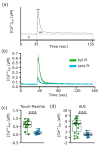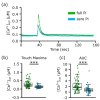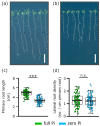Phosphate Deprivation Can Impair Mechano-Stimulated Cytosolic Free Calcium Elevation in Arabidopsis Roots
- PMID: 32942534
- PMCID: PMC7570281
- DOI: 10.3390/plants9091205
Phosphate Deprivation Can Impair Mechano-Stimulated Cytosolic Free Calcium Elevation in Arabidopsis Roots
Abstract
The root tip responds to mechanical stimulation with a transient increase in cytosolic free calcium as a possible second messenger. Although the root tip will grow through a heterogeneous soil nutrient supply, little is known of the consequence of nutrient deprivation for such signalling. Here, the effect of inorganic phosphate deprivation on the root's mechano-stimulated cytosolic free calcium increase is investigated. Arabidopsisthaliana (cytosolically expressing aequorin as a bioluminescent free calcium reporter) is grown in zero or full phosphate conditions, then roots or root tips are mechanically stimulated. Plants also are grown vertically on a solid medium so their root skewing angle (deviation from vertical) can be determined as an output of mechanical stimulation. Phosphate starvation results in significantly impaired cytosolic free calcium elevation in both root tips and whole excised roots. Phosphate-starved roots sustain a significantly lower root skewing angle than phosphate-replete roots. These results suggest that phosphate starvation causes a dampening of the root mechano-signalling system that could have consequences for growth in hardened, compacted soils.
Keywords: Arabidopsis; FERONIA; calcium; mechano; phosphate; root; skew; touch.
Conflict of interest statement
The authors declare no conflict of interest.
Figures





References
-
- Nakagawa Y., Katagiri T., Shinozaki K., Qi Z., Tatsumi H., Furuichi T., Kishigami A., Sokabe M., Kojima I., Sato S., et al. Arabidopsis plasma membrane protein crucial for Ca2+ influx and touch sensing in roots. Proc. Natl. Acad. Sci. USA. 2007;104:3639–3644. doi: 10.1073/pnas.0607703104. - DOI - PMC - PubMed
Grants and funding
LinkOut - more resources
Full Text Sources

